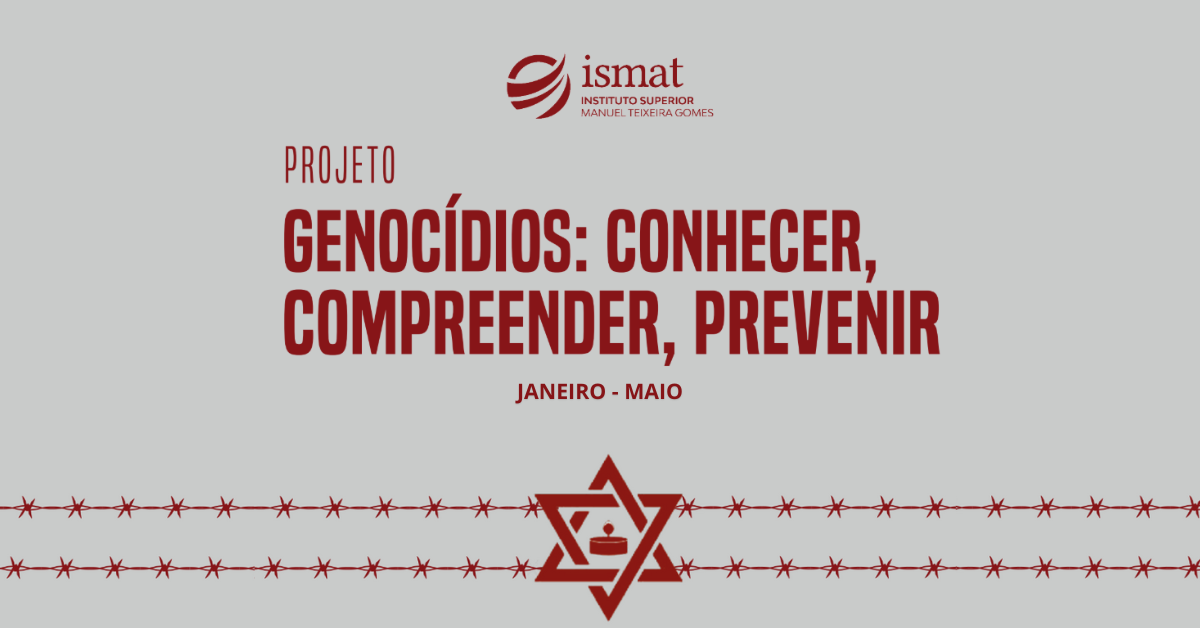The activities will take place between January and May
The activities are mainly concentrated in the second semester of the 2024-2025 academic year, organised into four phases structured around the logic Know, Understand, Prevent.
Activity Plan
- KNOW THE GENOCIDE - 27 January
Genocide, concept and meaning as a violation of Human Rights: from the Nazi Genocide to current Genocides
The first phase begins with the Commemoration of International Holocaust Remembrance Day (UN General Assembly Resolution 60/7 of 2005), this year coinciding with the 80th anniversary of the liberation of Auschwitz, which aligns with the International Day of Commemoration and Dignity of the Victims of the Crime of Genocide and of the Prevention of this Crime (9 December), celebrating the approval of the International Convention on the Prevention and Punishment of the Crime of Genocide on 9 December 1948.
This phase aims to introduce the precise concept of Genocide as well as the history of Genocide in the 20th and 21st centuries (motivations, processes, methods, victims and perpetrators), with particular emphasis on the Nazi Genocide and its relation to the process of consolidating the new Human Rights paradigm post-1948, as well as current genocides, especially those involving the Rohingya (Myanmar), the Uyghurs (China), and the Palestinians (Gaza).
Three essential activities are planned:
- Conference on the Nazi Genocide, including the Holocaust.
- Multimedia exhibition on Genocide, involving the concept and history of Genocide in the 20th and 21st centuries. The exhibition will be located in the "Cisterna" space and will remain open to faculty and students of ISMAT as well as external visitors throughout the project's duration.
- Project presentation session: a session aimed at the ISMAT community and the surrounding social community, with the participation of the interdisciplinary team members and the ISMAT management.
- UNDERSTAND THE GENOCIDE - 24 and 25 March
The process of Genocide: organisational and symbolic aspects
The second phase focuses on the process of Genocide, its stages and methods, and examines both material (space, architecture, methods, organisation) and symbolic dimensions. The concentration camps and "death factories", the architecture of Genocide, its operation, and the relationships between the members of the genocidal machinery and the victims will be analysed. Additionally, aspects related to propaganda, mass mobilisation, racist ideology and its diffusion, and the link between genocide and slavery will be addressed.
Four activities are planned:
- Roundtable with team members and invited guests
- Book presentation session for "Jews, Tragedy and Hope" by lecturer Pedro Pereira
- Exhibition on the architecture of Genocide, the plans of the concentration camps, and space design
- Exhibition on the power and impact of symbolism on the masses
- UNDERSTAND THE GENOCIDE - 12 and 13 May
The Victims of Genocide: suffering, dehumanisation, and reparation
The third phase will focus on the victims, both direct and indirect, the process of physical and psychological suffering, dehumanisation, and their right to reparation, with the main objective of promoting the humanisation of the victims.
Four activities are planned:
- Roundtable
- Multimedia installation with testimonies from victims
- Exhibition created by Psychology students on the psychological effects of the genocide process and the long-term effects on surviving victims.
- Drama performance, with the participation of a professional actor, portraying specific cases of victims and perpetrators of genocide.
- PREVENT GENOCIDE - 26 and 27 May
Prevent Genocide, Act and Mobilise citizens and civil society
The fourth phase focuses on prevention and action to prevent Genocide by discussing and defining effective strategies for prevention at both the local and global levels, involving both general and special prevention, inspired by the Genocide Watch model.
Four activities are planned:
- Roundtable on prevention strategies involving education for human rights and about genocide, memory, remembering the victims, reparation, and accountability.
- Exhibition on "Hate Speech, Dehumanisation: Regulation and Criminalisation" prepared by Law students, reflecting on the criminalisation of racial hate speech and its effective implementation.
- Installation on the Memorial for the victims, human dignity, and interculturality, created by Architecture students.
- Collective Mural - Placement of a backdrop to encourage participation by recording ideas, comments, and opinions from students, teachers, staff, and external visitors.








